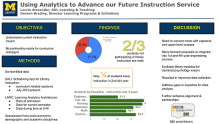Doreen R Bradley
Posts tagged with Analytics in Blog Tiny Studies
Showing 1 - 4 of 4 items

Working with large-scale datasets to understand the effect of library resources on student success raises a number of concerns around individual privacy, data security, and analysis. This blog post, summarizing a recent article in College & Research Libraries, describes a recent grant-funded project at the University of Michigan, discusses the steps we took to address those concerns, and some of the lessons we learned.

When you use library services, do you think about the interaction-generated data? The U-M Library collects data on its patrons, from user profiles to online resource access information. Recently, the library has considered using this data to engage in library analytics, making inferences about users’ future behaviors. An Engagement Fellows project that began in 2020 seeks to learn more about what library patrons think of the use of analytics at the U-M Library.

The 2018 Library Assessment Conference (https://libraryassessment.org/) brought together a community of practitioners and researchers who have responsibility or interest in the broad field of library assessment. This post recaps the conference poster content presented by Laurie Alexander and Doreen Bradley about how analytics advanced the Library's internal understanding of the course-integrated instruction provided by Library staff.

Not everything a library wants to know is available via web-scale analytics tools such as Google Analytics. Often, custom instrumentation and logging are the best way to answer usability and analytics questions, and can offer better protections for patron privacy as well.